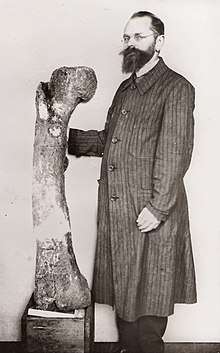Bahariasauridae
Bahariasauridae is a potential family of averostran theropods that might include a handful of African and South American genera, such as Aoniraptor, Bahariasaurus, Deltadromeus, and Gualicho.[1][2] The placement of these theropods is controversial, with some studies placing them as basal ceratosaurs possibly related to Noasauridae (which they may also include the otherwise noasaurid subfamily Elaphrosaurinae),[1] others classifying them as megaraptorans,[2][3] basal neovenatorids,[4] or basal coelurosaurs.[5][6] There is also a possibility the group might not be monophyletic, as a monograph on the vertebrate diversity in the Kem Kem Beds published in 2020 found Bahariasaurus to be nomen dubium.[7] In the same paper Deltadromeus is classified as an abelisaurid.[7]
| Bahariasaurids | |
|---|---|
 | |
| The paleontologist Ernst Stromer with the femur of Bahariasaurus. | |
| Scientific classification | |
| Kingdom: | Animalia |
| Phylum: | Chordata |
| Clade: | Dinosauria |
| Clade: | Saurischia |
| Clade: | Theropoda |
| Clade: | Averostra |
| Family: | †Bahariasauridae Huene, 1948 |
| Type species | |
| †Bahariasaurus ingens Stromer, 1934 | |
| Subclades | |
| |
References
- Chiarenza, Alfio Alessandro; Cau, Andrea (2016). "A large abelisaurid (Dinosauria, Theropoda) from Morocco and comments on the Cenomanian theropods from North Africa". PeerJ. 4 (e1754): e1754. doi:10.7717/peerj.1754. PMC 4782726. PMID 26966675.
- Motta, Matías J.; Aranciaga Rolando, Alexis M.; Rozadilla, Sebastián; Agnolín, Federico E.; Chimento, Nicolás R.; Egli, Federico Brissón; Novas, Fernando E. (June 2016). "New theropod fauna from the Upper Cretaceous (Huincul Formation) of northwestern Patagonia, Argentina". New Mexico Museum of Natural History and Science Bulletin. 71: 231–253 – via ResearchGate.
- Samathi, A.; Chanthasit, P.; Martin Sander, P. (May 2019). "Two new basal coelurosaurian theropod dinosaurs from the Lower Cretaceous Sao Khua Formation of Thailand". Acta Palaeontologica Polonica. doi:10.4202/app.00540.2018.
- Apesteguía S, Smith ND, Juárez Valieri R, Makovicky PJ (2016). "An Unusual New Theropod with a Didactyl Manus from the Upper Cretaceous of Patagonia, Argentina". PLOS One. 11 (7): e0157793. Bibcode:2016PLoSO..1157793A. doi:10.1371/journal.pone.0157793. PMC 4943716. PMID 27410683.
- Juan D. Porfiri; Rubén D. Juárez Valieri; Domenica D.D. Santos; Matthew C. Lamanna (2018). "A new megaraptoran theropod dinosaur from the Upper Cretaceous Bajo de la Carpa Formation of northwestern Patagonia". Cretaceous Research. in press: 302–319. doi:10.1016/j.cretres.2018.03.014.
- Delcourt, R.; Grillo, O. N. (2018). "Tyrannosauroids from the Southern Hemisphere: Implications for biogeography, evolution, and taxonomy". Palaeogeography, Palaeoclimatology, Palaeoecology. 511: 379–387. Bibcode:2018PPP...511..379D. doi:10.1016/j.palaeo.2018.09.003.
- Ibrahim, Nizar; Sereno, Paul C.; Varricchio, David J.; Martill, David M.; Dutheil, Didier B.; Unwin, David M.; Baidder, Lahssen; Larsson, Hans C. E.; Zouhri, Samir; Kaoukaya, Abdelhadi (2020-04-21). "Geology and paleontology of the Upper Cretaceous Kem Kem Group of eastern Morocco". ZooKeys. 928: 1–216. doi:10.3897/zookeys.928.47517. ISSN 1313-2970.